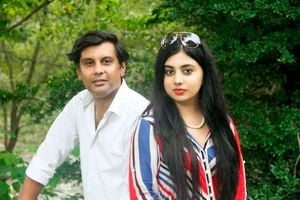It’s our duty to acknowledge and honour the true heroes of Kenya

The founding father of the nation, Mzee Jomo Kenyatta speaks with Mr Oginga Odinga (with his back to the camera) in Kisumu in 1969. FILE PHOTO | NATON MEDIA GROUP
What you need to know:
- During this year’s Mashujaa Day celebration, President Uhuru Kenyatta did well to acknowledge two categories of Kenyan heroes — Mau Mau and freedom fighters who fought for independence and second liberation fighters who spent years in prison and detention, fighting against one-party dictatorship.
- When hyenas appoint commissions to select heroes, they pick their fellow hyenas. Similarly, when sheep appoint commissions to pick heroes, they also pick their fellow sheep.
About 130 years ago, our collective homestead called Kenya was raided, conquered, and declared a white man’s country. While most people hid and ran for cover, a few courageous people took up arms, fought for independence and won. These people became heroes of our first liberation.
After independence, however, our black leaders became our masters, subjecting our country to the tyranny of one party dictatorship that denied our people land, democracy, rights, and freedom. Like before, most people took cover and accepted tyranny. A few people, however, challenged black enslavement, won the war, and became the heroes of our second liberation.
During this year’s Mashujaa Day celebration, President Uhuru Kenyatta did well to acknowledge two categories of Kenyan heroes — Mau Mau and freedom fighters who fought for independence and second liberation fighters who spent years in prison and detention, fighting against one-party dictatorship. A country without heroes is bound to wither and die.
There was, however, one category of heroes that was not recognised — the outstanding patriots who are the political enemies of those in power.
At the peak of one-party dictatorship, my friend Mirugi Kariuki and I visited Jaramogi Oginga Odinga at his Kisumu house. We noticed a collection of photographs of African leaders such as Julius Nyerere, Kwame Nkrumah, Patrice Lumumba, Haile Selassie, Abed Nasser, and Jomo Kenyatta.
The Jomo Kenyatta photograph puzzled us because he had been both a great friend and political enemy of Jaramogi. We asked him why he had Jomo Kenyatta on his wall when he had detained him despite his (Jaramogi’s) support before independence.
Jaramogi asked us to look closely at the picture. He explained that the Kenyatta on his wall was Kenyatta the freedom fighter, not Kenyatta the president, with whom he had fallen out. Still, that did not clarify the matter for us.
Jaramogi explained that he honoured Kenyatta because he had been a great freedom fighter. He said that despite their differences, he could not disown, revise, or deny the fact of history that Kenyatta had been a freedom fighter. That is why he counted Kenyatta among those he honoured and acknowledged as his personal, African, and Kenyan heroes.
When Kenyatta died, Jaramogi went to mourn the freedom fighter. I was amazed at Jaramogi’s generosity. Had I had the opportunity to meet Kenyatta afterwards, I would have asked him whether he considered Jaramogi his personal, national, and African hero, as Jaramogi did him.
In unequal societies, heroes lead people in doing good while bad leaders lead people in doing evil. Nations acknowledge heroes to inspire people. But nations perish when they kill their heroes and substitute them with those who promote evil, greed, selfishness, and corruption. A hero is a person who makes sacrifices to save others, not expecting any payment or reward, one who risks his or her life, family, or property in order to rescue the country and fellow human beings from danger, a person who puts the interests of others before his or her own.
Heroes are not gods, or perfect, or leaders. We honour heroes because they do good, confront problems, and do not fear dying in order to save others. Most of us think that heroes must be leaders, rich people, or celebrities. Leaders do not become heroes because they have named streets, airports, hospitals, and universities after themselves. True heroes serve God and people and should be acknowledged when they are still alive.
The people have a duty and responsibility to acknowledge heroes. Heroes such as J.M. Kariuki, Alexander Muge, and Tom Mboya should not be denied honour because acknowledging them would shame their assassins. Tragically, Kenyans cannot agree on who their heroes are because this country has become a jungle society where hyenas have their heroes and sheep their own.
When hyenas appoint commissions to select heroes, they pick their fellow hyenas. Similarly, when sheep appoint commissions to pick heroes, they also pick their fellow sheep. This is what we do in Kenya.
Mr Wamwere is a former MP for Subukia. [email protected]





